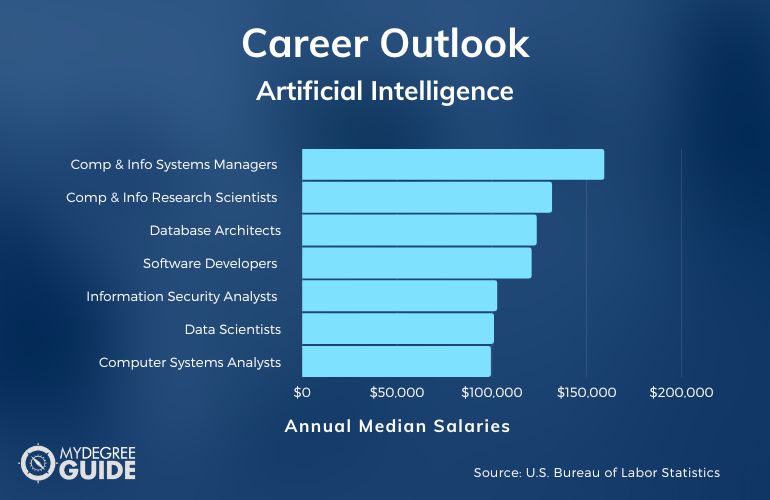A masters in artificial intelligence is a STEM-oriented program that includes advanced coursework in computer science.

If you’re interested in learning about the processes of developing AI and machine learning systems, this degree program could be a good fit. You’ll study various components of AI systems and modeling and machine learning, such as deep learning, algorithm design, language processing, and human-AI interaction.
Editorial Listing ShortCode:
The computer science and information technology space is growing as more businesses are turning to AI systems to operate more efficiently and provide consumers with a better experience.
Online Masters in Artificial Intelligence Programs

An artificial intelligence master’s degree can help you develop advanced knowledge on a variety of AI topics. As technology continues to advance, businesses are becoming more reliant on AI and machine learning systems to make business operations easier and more efficient.
A masters in artificial intelligence can help prepare you for careers in the computer and information technology field. A strong STEM background can be beneficial if you’re interested in pursuing an advanced degree in artificial intelligence.
The program is designed to introduce you to AI and machine learning systems. The curriculum of a masters degree in AI encompasses subject areas like the following:
- Computer science
- Robotics
- Machine learning
- Mathematics
You can learn how to identify problems and how to design and implement artificial intelligence and machine learning to solve complex issues that apply to real-world situations.
Editorial Listing ShortCode:
Foundational coursework focuses on analyzing data, algorithmic principles, AI and machine learning modeling and design, human-AI interaction, and legal and ethical issues surrounding the use of AI. Skills and knowledge acquired throughout the program can help prepare you for a variety of STEM careers, such as:
- AI research scientist
- Software developer
- Software engineer
- Data scientist
- Machine learning engineer
- Computer vision engineer
- Business intelligence developer
AI and machine learning systems can be found in a range of industries, such as manufacturing, healthcare, and banking.
Professionals in the computer and information technology sector can use AI and machine learning systems to compile data and make data-driven decisions for businesses. Artificial intelligence can also be used to improve consumer experiences.
If you have a strong interest in STEM subjects and want to pursue a career that involves working with AI systems, earning a master’s in artificial intelligence could help you work toward your goals.
Common Artificial Intelligence Online Masters Concentrations

Artificial intelligence graduate programs may offer concentrations that allow you to specialize in a specific area of AI or computer science, such as:
- Machine Learning. Machine learning is a subspecialty of AI. It focuses on creating and implementing algorithms so AI systems can identify patterns and analyze data.
- Robotics. This concentration studies robotics and autonomous systems with an emphasis on intelligent systems and robotics algorithms.
- Data Science and Data Analytics. This concentration focuses on advanced concepts and principles of data science and analytics—such as applied statistics, database systems, and decision analytics—in the context of AI and machine learning systems.
- Deep Learning. This specialization studies neural networks in order to design and implement AI and machine learning systems that mimic human-like intelligence to analyze data and operate independently.
- Cybersecurity. This concentration focuses on designing and implementing AI systems used to protect networks, detect cyber threats, and analyze attacks.
Adding a concentration to your degree program can help you narrow down your area of study and focus on topics that are more closely related to the field you wish to enter or advance in.
Artificial Intelligence Careers & Salaries

Much like with earning an online masters in data science, earning an AI master online can help prepare you for a number of technical careers. A number of industries are taking advantage of AI and machine learning systems to improve user experiences and make business operations more efficient.
AI careers can be found in several industries, such as marketing, healthcare, business, and education. Professionals working in AI develop algorithms for these systems, which can collect and analyze data to report on various trends and meet specific needs.
According to the Bureau of Labor Statistics, these are the annual median salaries of some of the careers that are related to the study of artificial intelligence.
| Careers | Annual Median Salaries |
| Computer and Information Systems Managers | $159,010 |
| Computer and Information Research Scientists | $131,490 |
| Database Architects | $123,430 |
| Software Developers | $120,730 |
| Information Security Analysts | $102,600 |
| Data Scientists | $100,910 |
| Computer Systems Analysts | $99,270 |
| Statisticians | $95,570 |
| Computer Programmers | $93,000 |
| Operations Research Analysts | $82,360 |
More specific job titles that fall within the occupations listed include AI engineer, robotics engineer or programmer, AI research scientist, and cyber intelligence analyst.
Editorial Listing ShortCode:
If you want to design, develop, and test artificial intelligence tools and systems, you might enjoy a career in the engineering sector. A programmer or algorithm developer position might be more in your wheelhouse if you want to design algorithms for AI and machine learning systems.
MS in Artificial Intelligence Curriculum & Courses

The curriculum of a Master of Science in Artificial Intelligence heavily focuses on programming, algorithms, legal and ethical issues in AI, and data collection and analysis. These are some general courses typically offered in artificial intelligence graduate programs:
- Introduction to Programming: This course introduces you to programming principles and techniques.
- Applications of Machine Learning: You can learn about the basics of machine learning and how various applications are used to collect and analyze data to solve complex issues.
- Applied Artificial Intelligence: This course examines AI concepts and methods, such as deep learning, neural networks, and search algorithms.
- Deep Learning: This course dives deeper into machine learning and introduces you to deep learning applications and algorithms.
- Data Analysis and Interpretation: In this course, you can learn various data analysis methods to interpret data through statistical and algorithmic means.
- Data Structures and Algorithms: Students are introduced to algorithm applications and learn how to analyze and implement algorithms and analyze data structures.
- Human-AI Interaction: This course examines how AI systems and humans interact and explores ethical challenges that come with designing and developing AI systems.
- Natural Language Processing with Deep Learning: This is a research-centered course that focuses on natural language processing, which involves the study of computer capabilities in understanding human language and image interpretation.
- Advanced Artificial Intelligence: This advanced course focuses on the uncertainties of designing and building AI machines for dynamic environments and working with real-world data sets and problems.
- Introduction to Computer Vision: Students develop an understanding of computational models and programming to explore computer vision applications, such as image formation, sensing, and registration.
Core AI coursework can help you develop advanced skills and knowledge on AI design and modeling, data analysis, language processing, statistics, and more.
AI Masters Degree Admissions Requirements

There are a number of materials and criteria that colleges and universities request from students who are applying for a master’s program, such as:
- All undergraduate transcripts along with any graduate transcripts
- GRE scores (only some schools require them)
- Statement of purpose
- Defined number of credits in computer science or related coursework
Admissions requirements can vary between schools, but official transcripts are one of the main documents students are asked to submit. Some AI master’s programs require you to have foundational coursework in computer science completed for entry.
Artificial Intelligence Masters Programs Accreditation

It can be important to consider a school’s accreditation status when applying for a master’s program. Many colleges and universities only accept credit transfers from accredited institutions. It can also be important for future employment and education opportunities.
The accreditation status of a school is determined through a screening process conducted by a regional accrediting organization. Although institutions aren’t required to seek regional accreditation, it assures students that their programs and instruction, resources, and faculty meet or exceed quality standards.
Editorial Listing ShortCode:
You can find a list of accredited postsecondary institutions on the US Department of Education’s website.
Financial Aid and Scholarships

Financial aid and scholarships may help you reduce the cost of attendance. Financial aid can come in many forms, including state or federal aid and work-study programs. These forms of financial aid are income-based.
To be eligible for federal aid, it’s necessary to demonstrate financial need. You can find out if you’re eligible for federal assistance by submitting a Free Application for Federal Student Aid (FAFSA) via the US Department of Education.
Scholarship opportunities can be based on income, major, merit, location, and more. Scholarships may be awarded as a one-time payment, while others renew every year you’re in school.
What Is a Masters in Artificial Intelligence?

A masters in artificial intelligence (AI) is a STEM-focused graduate program that combines AI and machine learning topics. You can develop an understanding of AI machine functions, data structures, natural language processing, and algorithm design and testing.
Foundational coursework is based on computer science and mathematics subject matter. If you have a bachelor’s degree in an unrelated field, obtaining a graduate certificate in a related field may prepare you for an AI master degree. Some artificial intelligence graduate programs include a thesis component, which gives you the opportunity to demonstrate the skills and knowledge you’ve acquired throughout the program.
What Can You Do with a Masters in AI and Machine Learning?

There are several industries that offer artificial intelligence career opportunities. Common fields that AI professionals work in include engineering, data science, and computer science.
AI engineering involves the development of AI systems and models. If you’re more interested in developing AI algorithms and analyzing and storing data, a data scientist or computer and information research scientist position might be an option. Other AI-related roles include software engineer, AI specialist, machine learning engineer, and business intelligence developer.
A degree in AI can also be used for collecting and analyzing data in the fields of marketing, healthcare, and education.
How Long Does It Take to Get an Artificial Intelligence Masters Online?

A 36 credit hour AI master program may be completed in 1 year if no thesis is required and you stay continuously enrolled year-round as a full-time student.
Editorial Listing ShortCode:
Some programs may only require 30 credit hours to complete, while others include more. Most masters programs can be completed in 1 to 2 years with full-time study. If a thesis is required, this can add additional time. Researching and writing a thesis may add an extra semester or more. A masters degree can also take longer to complete if you’re enrolled as a part-time student.
What Skills Do You Learn in a Master’s Degree in Artificial Intelligence?

There are several hard and soft skills you can acquire and enhance throughout an AI master’s program. Core courses that help you develop essential skills in AI include:
- Algorithm design and analysis
- Software engineering
- Artificial intelligence principles and techniques
- Applied machine learning
These courses can help you develop hard skills in designing algorithms, analyzing data, developing AI software, and applying AI and machine learning methods and techniques. Important soft skills that you can develop throughout the program include problem-solving, critical thinking, communication and collaboration, and attention to detail.
What’s the Difference Between a Master’s in Artificial Intelligence vs. Machine Learning?
An artificial intelligence master degree includes the study of machine learning, but there are some key differences between these degrees.
| Artificial Intelligence MS Degree | Machine Learning MS Degree |
|
|
The curriculum for an AI masters degree is broader in terms of the subject matter studied, whereas machine learning is a subfield of AI.
What’s the Difference Between Data Science vs. Artificial Intelligence Master Programs?
A masters degree in data science shares some similarities with an AI masters, but these are some differences between the two programs of study.
| Data Science Master Program | AI Master Program |
|
|
An AI masters program includes coursework in data science, but a data science program lacks emphasis on AI systems for data retrieval and analysis.
Is a Masters in Artificial Intelligence Online Worth It?

Yes, a masters in artificial intelligence online is worth it for many students. As industries continue to incorporate artificial intelligence into daily operations, the need for professionals to develop AI and machine learning systems will grow.
According to the Bureau of Labor Statistics, employment for computer and information research scientists is projected to grow 21% over the next ten years. This is much faster than the average growth for all occupations. Related occupations are projected to have similar growth.
Editorial Listing ShortCode:
An online AI master’s degree may help you advance in your current position or enter the field as a competitive professional.
Universities Offering Online Masters in ArtificialIntelligence Degree Programs
Methodology: The following school list is in alphabetical order. To be included, a college or university must be regionally accredited and offer degree programs online or in a hybrid format.

Campbellsville University offers an MS in Data Science and Artificial Intelligence program online. Potential courses include Big Data Analytics, Design Thinking, Data Mining and Warehousing, and Ethical Issues for Artificial Intelligence.
Courses are typically taught using an asynchronous format and are commonly offered in 8 week blocks. There are usually 6 start dates each year. The program requires the completion of 36 credit hours.
Campbellsville University is accredited by the Southern Association of Colleges and Schools Commission on Colleges.

Colorado State University offers a Master of Science in Artificial Intelligence and Machine Learning program online. Most classes are taught using an asynchronous format.
Terms are typically 8 weeks long, and there are usually monthly start dates. Advanced courses in Discrete Mathematics and in Probability and Statistics must have already been completed before admission to the program. The completion of 30 credit hours is required.
Colorado State University is accredited by the Higher Learning Commission.

DePaul University offers an MS in Artificial Intelligence program online, with some courses also available on campus. Potential courses include Statistics and Data Analysis, Discrete Structures for Computer Science, Introduction to Programming, and Data Structures. Courses typically follow a semester schedule and are usually offered in the fall, winter, spring, and summer. The program requires the completion of 30 credit hours.
DePaul University is accredited by the Higher Learning Commission.

Drexel University offers an MS in Artificial Intelligence and Machine Learning program online. Concentrations include Data Science and Analytics, Computation and Algorithms, and Applications of Artificial Intelligence. Courses are typically offered in 10 week quarters, and there are usually 4 start dates per year. The completion of 10 classes for 45 quarter credits is required.
Drexel University is accredited by the Middle States Commission on Higher Education.

Duke University offers a Master of Engineering in Artificial Intelligence for Product Development program online but with 1 residency required.
Potential courses include Sourcing Data for Analytics, Modeling Process and Algorithms, and Deep Learning Applications. Courses typically follow a semester schedule and are offered in the fall, spring, and summer. Opportunities to work with industry leaders through a capstone project and a summer internship are commonly offered.
Duke University is accredited by the Southern Association of Colleges and Schools Commission on Colleges.

Johns Hopkins University offers a Master of Science in Artificial Intelligence program online. Potential courses include Applied Machine Learning, Creating AI-Enabled Systems, and Algorithms for Data Science.
A proficiency exam may substitute for missing required prerequisites. Courses are typically taught asynchronously or may have live virtual meetings. Classes usually follow a semester schedule with fall, spring, and summer start dates.
Johns Hopkins University is accredited by the Middle States Commission on Higher Education.

Maryville University offers an online program for an MS in Artificial Intelligence. Typical areas of study include ethics of AI, machine learning, computer programming, natural language processing, robotics, and machine vision. Courses often follow a semester schedule, and there are typically 3 start dates per year. Certificates in Fundamentals of AI and in Advanced AI may be earned after completion of the program.
Maryville University is accredited by the Higher Learning Commission.

Pennsylvania State University’s World Campus offers an online program for a Master’s of Professional Studies in Artificial Intelligence. Potential courses include Natural Language Processing, Machine Vision, and Deep Learning.
The program requires the completion of 33 credits. Courses typically follow a semester schedule, and there are 3 yearly start dates. U.S. News & World Report listed the university among the best schools in the country for computer information technology.
Pennsylvania State University is accredited by the Middle States Commission on Higher Education.

Southern Methodist University offers an MS in Computer Science program online with a specialization in Artificial Intelligence. Potential courses include Machine Learning in Python, Applications for Sensing and Learning, and Data Mining. Courses commonly follow a regular semester schedule with fall, spring, and summer start dates. A GRE score waiver may be granted with an undergraduate GPA of 3.0 or higher.
Southern Methodist University is accredited by the Southern Association of Colleges and Schools Commission on Colleges.

Stevens Institute of Technology offers a Master of Engineering or a Master of Science in Applied Artificial Intelligence program online. A dual-enrollment MBA is also offered. Areas of study typically include transportation engineering, financial engineering, and embedded systems. The completion of 30 credit hours is required, and courses usually follow a regular semester schedule.
Stevens Institute of Technology is accredited by the Middle States Commission on Higher Education.

The University of Illinois–Chicago offers a Master of Engineering program online with a focus area in AI and machine learning. Potential courses include Innovation Tools and Methods, Intro to Deep Neural Networks, and Natural Language Processing. The completion of 36 credit hours is required. Courses are usually 8 weeks long, and the program may be completed in just 12 months.
The University of Illinois Chicago is accredited by the Higher Learning Commission.

The University of Michigan–Dearborn offers a Master of Science in Artificial Intelligence program online and on campus. Concentrations include Computer Vision, Intelligent Interaction, Machine Learning, and Knowledge Management and Reasoning. The program requires the completion of 30 credit hours and both a research-based thesis option and a project option are offered in addition to coursework.
University of Michigan – Dearborn is accredited by the Higher Learning Commission.

The University of San Diego offers an MS in Applied Artificial Intelligence program online. Potential courses include Machine Learning, Neural Networks and Deep Learning, Natural Language Processing, and Introduction to Computer Vision. Terms start in the summer, fall, and spring and are typically 14 weeks long, during which 2 courses are usually taken. The program requires the completion of 30 credit hours.
USD is accredited by the Accrediting Commission for Senior Colleges and Universities of the Western Association of Schools and Colleges.

The University of Texas–Austin offers an MS in Artificial Intelligence program online. Potential courses include Automated Logical Reasoning, Case Studies in Machine Learning, Online Learning and Optimization, and Principles of Machine Learning.
Courses typically follow a semester schedule. U.S. News & World Report ranked the university among the top ten schools in the country for computer science and artificial intelligence degrees.
The University of Texas at Austin is accredited by the Southern Association of Colleges and Schools Commission on Colleges.

The University of the Cumberlands offers a Master of Science in Artificial Intelligence in Business program online. Potential courses include Application of AI in Manufacturing, Application of AI in Sales and Marketing, and Application of AI in Healthcare. Courses are typically 8 or 16 weeks long. The completion of 30 credits of classes plus a 1 credit capstone project is required.
The University of the Cumberlands is accredited by the Southern Association of Colleges and Schools Commission on Colleges.
Getting Your Master in Artificial Intelligence Online

An artificial intelligence master’s degree program can let you advance your knowledge in computer science and help you develop skills in machine learning algorithm development and AI systems modeling.
The skills and knowledge you can acquire in an online artificial intelligence degree program could help prepare you for a computer science or information technology career. If you have an educational or work background in STEM and a strong interest in artificial intelligence, a master’s degree in AI could be a natural next step in your professional development.
You can take the first steps toward earning an artificial intelligence masters degree online by researching accredited institutions and programs that best match your career goals.

